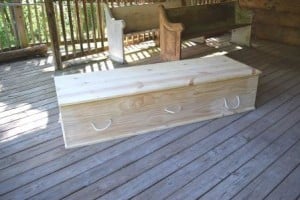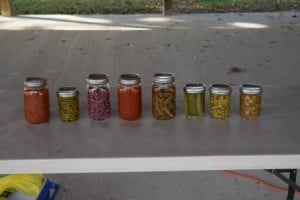As I talk with our gardeners, one thing becomes clear, this task is both art and science, luck and misfortune for those new to preparing soil, planting seeds in the ground and caring for what emerges from the earth. Several of us have had our tomatoes decimated by early blight while others are feverishly canning theirs.
One garden produces enough cucumbers and cabbages to feed an army while another is like the few loaves and fishes without the miracle by the sea. All of this with gardens that are only a few miles apart, yet one receives rain and another not. One garden has potato bugs and another not. Despite the problems, we are putting away food for the winter months what we are not giving to family and friends. One of the joys I find of working in a close community like we have on Barnes Mountain here in Estill County is that people share their wisdom and traditions as well as offering to help those in need. And it is not just the people here who help. Besides our gardens, St. Timothy’s has for years had volunteers come from across the eastern United States to spend a week helping with home repairs, storm clean up and providing day camps for local children and this week, feverishly finish two caskets needed today . Last week our guests were from Connecticut, this week Tennessee and next Maryland. They come to help and yet leave with more than they bring, knowing that they have made other’s lives better. Gardening is more work than most people suspect. Our food does not really come off a shelf, vacuum packed and date stamped. It comes from those large and small farmers and gardeners with dirt under their fingernails and muddy knees. It is the result of those who one day pray for rain and the next day pray for dry weather. It is those of us who plant and reap who understand how important it is to share what little knowledge we have with those who simply do not understand that we all must care for this earth.
. Last week our guests were from Connecticut, this week Tennessee and next Maryland. They come to help and yet leave with more than they bring, knowing that they have made other’s lives better. Gardening is more work than most people suspect. Our food does not really come off a shelf, vacuum packed and date stamped. It comes from those large and small farmers and gardeners with dirt under their fingernails and muddy knees. It is the result of those who one day pray for rain and the next day pray for dry weather. It is those of us who plant and reap who understand how important it is to share what little knowledge we have with those who simply do not understand that we all must care for this earth.



Leave A Comment